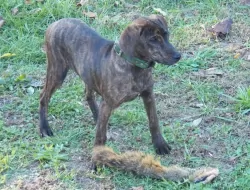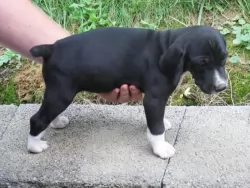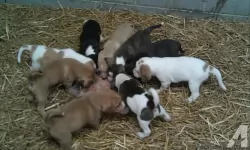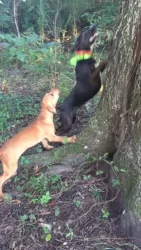 MyDogBreeds
MyDogBreeds Both Treeing Cur and Catahoula Leopard are originated from United States. Treeing Cur may grow 7 cm / 2 inches shorter than Catahoula Leopard. Treeing Cur may weigh 21 kg / 46 pounds lesser than Catahoula Leopard. Both Treeing Cur and Catahoula Leopard has almost same life span. Treeing Cur may have less litter size than Catahoula Leopard. Both Treeing Cur and Catahoula Leopard requires Low maintenance.
Both Treeing Cur and Catahoula Leopard are originated from United States. Treeing Cur may grow 7 cm / 2 inches shorter than Catahoula Leopard. Treeing Cur may weigh 21 kg / 46 pounds lesser than Catahoula Leopard. Both Treeing Cur and Catahoula Leopard has almost same life span. Treeing Cur may have less litter size than Catahoula Leopard. Both Treeing Cur and Catahoula Leopard requires Low maintenance.
 The Treeing Cur dog is a mixed-breed, working dog which hails from the USA and recognized by the United Kennel Club in November 1998.
The Treeing Cur dog is a mixed-breed, working dog which hails from the USA and recognized by the United Kennel Club in November 1998.
They’ve always been used to tree animals such as squirrels, raccoons, bears, and even mountain lions. They were developed to be used as hunting and guarding dogs.
Aside from these good qualities, today the dog makes an excellent family companion.
 This working dog breed originates from America’s Deep South. In fact it was originally named after a small village in the state of Louisiana and was made the state’s official dog in 1979. The dog is believed to have come from the Mastiff and Greyhound.
This working dog breed originates from America’s Deep South. In fact it was originally named after a small village in the state of Louisiana and was made the state’s official dog in 1979. The dog is believed to have come from the Mastiff and Greyhound.
Known as war dogs they were left with local tribes who crossed them with wolves, and French Beauceron blood was also included.
A number of Catahoula dog Associations were started and the Louisiana Catahoula Cur Association was formed in 1976, followed by others. These Associations work to promote the breed. In 1995 the United Kennel Club was the first national dog registry to recognize the Catahoula.
 Standing at between 46 – 61cm in height and weighing between 14 – 27kg, the medium-sized Treeing Cur is athletic and muscular.
Standing at between 46 – 61cm in height and weighing between 14 – 27kg, the medium-sized Treeing Cur is athletic and muscular.
He has a short to medium-length double coat that can be in a number of colors. Red and white, tan and white, black and white, brindle, some freckling and bi-colored or tri-colored.
The eyes are mostly brown but can be green or blue too. They’re well-muscled and robust and have medium length floppy ears. The tail is mostly docked but is sometimes left long.
These dogs are alert and intelligent, being easy to train and wanting to please their owners, getting along well with all members of the family, including children and other dogs.
They’re strong-willed dogs and will require training and socialization if you want them to be well behaved wherever they are. He is intelligent so there won’t be any trouble with training him. He is very responsive to what his owner requires of him, with a desire to make their owners pleased with them.
 Known as the Leopard dog because of the distinctive spotted patches on his short to medium length coat, this interesting looking spotted dog can have a coat of many colors such as solid colors, brindle and a blend of several colors including blue merle and red merle, black and tan.
Known as the Leopard dog because of the distinctive spotted patches on his short to medium length coat, this interesting looking spotted dog can have a coat of many colors such as solid colors, brindle and a blend of several colors including blue merle and red merle, black and tan.
He is a muscular and athletic dog of medium to large size with sturdy legs and deep chest. He stands at 56 – 68cm and weighs 20 – 50kg. Many of these dogs have webbing between the toes which gives them an advantage when running through marshy areas or when swimming.
With his floppy ears, the tail is long or bobtailed. An unusual aspect with the dog is his eyes – having what is known as marbled glass eyes which are blue or blueish-white in color.
The Catahoula Leopard Dog can be stubborn and he is also energetic, fearless and highly intelligent. You’ll want to have him trained and socialized early as then he becomes a more relaxed, obedient dog. He is an assertive dog but not aggressive by nature.
Catahoulas in general are even tempered and they are willing to share their space with children in the home as well as other pets. They are protective of children and of their entire human family, making good watchdogs.
 The Treeing Cur is a working dog that loves all the action. He is an alert, intelligent dog, and being territorial and protective, he makes an excellent guardian dog too.
The Treeing Cur is a working dog that loves all the action. He is an alert, intelligent dog, and being territorial and protective, he makes an excellent guardian dog too.
They can show some aggression towards strangers and other dogs they don’t know. Apart from being an excellent hunting dog, the Treeing Cur loves to be around their human family, making loyal and loving companions.
 The Catahoula makes a fine family pet but he is a dog which shouldn’t be left outside day after day. He is a companion dog and won’t thrive without the companionship of his human family.
The Catahoula makes a fine family pet but he is a dog which shouldn’t be left outside day after day. He is a companion dog and won’t thrive without the companionship of his human family.
He is highly intelligent and also energetic, and if you want him to be relaxed and amicable around other humans and pets in the home he will require training and socialization. For training and ownership, the Catahoula Leopard will require a strong, firm, confident personality and he’ll be an obedient, loving and loyal companion.
 These dogs are very healthy and you’re not likely to have many vet bills when you bring one into your home.
These dogs are very healthy and you’re not likely to have many vet bills when you bring one into your home.
The Treeing Cur has floppy ears, and particularly if it's a dog that loves swimming, it will battle with moisture in the ears. Dogs with floppy ears don’t have good air-flow inside the ears like a dog with erect ears would have. This means that the dog is prone to ear infections.
This is such a common dog illness that can strike even young dogs. That is why it is important to check your dog over regularly for lumps and bumps on the body. Age increases the risk of cancer, so if you feel an unusual lump on your Treeing Cur, better to have your dog checked out at the vet.
 Your Catahoula Leopard is a healthy dog breed and with good care he can live to be 10 to 14 years of age. However, there are a number of reasons why some of the healthiest dogs can become ill.
Your Catahoula Leopard is a healthy dog breed and with good care he can live to be 10 to 14 years of age. However, there are a number of reasons why some of the healthiest dogs can become ill.
Knowing about these illnesses means you can take action and minimize the pain and suffering your pet might have to otherwise endure.
You’ll notice your pet shaking his head and maybe even scratching his ears. Ear infections are more evident in dogs with floppy ears and there can be an ear discharge. When left untreated, the ears can become painful and then it is time to get him to the vet.
This is a common illness in dogs and can be terribly uncomfortable and debilitating for your pet as he tries to urinate all the time with no success. Signs of UTI can include this excessive urination with little urine coming out, lethargy and discomfort. Take your pet immediately to the vet to be checked over.
 Being an energetic working dog, this dog isn’t going to be content to be lying around. He is going to need regular exercise. He loves a brisk walk or even a run next to you when you go cycling.
Being an energetic working dog, this dog isn’t going to be content to be lying around. He is going to need regular exercise. He loves a brisk walk or even a run next to you when you go cycling.
When at home, you can consider ball games and hide and seek games with him. They just love to run, and if you live near a park, he will want to be off the leash if possible for some free running and sniffing around.
The short coat of the Treeing Cur will do well with a brush twice a week. While you brush your dog, check him out for ticks and fleas. Also, check him over for any unusual lumps.
Part of his grooming should be to check inside his ears for signs of redness, to make sure his eyes are nice and bright still and to see if he will let you look inside his mouth for bad teeth. Bad teeth can be a source of pain for him.
Caring for your Treeing Cur in a responsible manner means ensuring good food. Such an active dog will require proper nutrients so as to meet his energy and health needs.
Your Treeing Cur will need a high-quality commercially manufactured dog food for active dogs and they will also benefit from other simple cooked foods such as boiled chicken, brown rice and vegetables. The habit of feeding your Treeing Cur human foods such as chocolates, popcorn, peanuts, onions and spices could cause digestive upsets and possible vet fees.
 A dog makes such a splendid pet, willing to give loyal and loving friendship to humans, even those who don’t treat him properly. When you think of the unconditional love your Catahoula Leopard dog will give you, surely you want to provide him with good food and shelter.
A dog makes such a splendid pet, willing to give loyal and loving friendship to humans, even those who don’t treat him properly. When you think of the unconditional love your Catahoula Leopard dog will give you, surely you want to provide him with good food and shelter.
It can be devastating if your dog goes missing, and if he has no identification, to find him might only mean telling people what he looks like. Rather put a collar on him and an ID tag so that your chances of getting him back are just that much better.
You can also have him micro-chipped by your veterinarian and these chips have a unique code which can provide useful information on your pet.
Make sure that your pet is vaccinated as a puppy against diseases which could be deadly such as rabies.
If you have no intention of allowing your Catahoula Leopard to have puppies, rather have him neutered or spayed if its a female. It is better for them and they can live longer and be free of some ailments that at un-spayed or un-neutered dog may get.